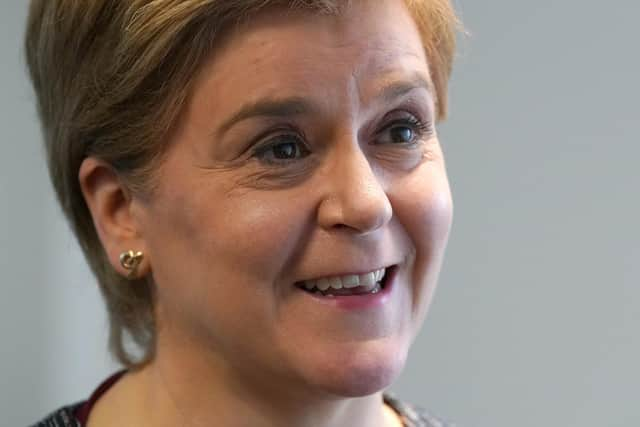Nicola Sturgeon: Ukraine war strengthens case for independent Scotland to join Nato
Her comments came after Sweden and Finland moved towards joining Nato, marking a major shift in the Scandinavian countries’ foreign policies following the Russian invasion of Ukraine.
The SNP leader also talked up the possibility of the “huge potential” of hydrogen energy, stating Scotland could see the technology become a “significant industry” and Europe’s “biggest source” of hydrogen.
Advertisement
Hide AdAdvertisement
Hide AdAddressing the Brookings Institution in Washington DC, the First Minister said the war in Ukraine had “strengthened my conviction” that the policy of joining Nato post-independence was the correct choice.
However, she faces disagreement within her own government with co-leader of the Scottish Greens, Patrick Harvie, reiterating his own party’s opposition to Nato membership for an independent Scotland.
Ms Sturgeon said the previously “unthinkable” decision of Sweden and Finland to move to join Nato, alongside the war in Ukraine, had strengthened her belief Nato membership would be vital for Scotland’s security due to the threat posed by Russia.
The SNP leader said that she was “acutely aware” of Scotland’s “strategic position” in northern Europe, highlighting Russian jets and submarines often coming close to the waters of the UK.
She said: “I am firm in my view that - coupled with a strong relationship with the UK – membership of the EU and of Nato will be cornerstones of an independent Scotland’s security policy.


“And so we are clearer than ever that membership of Nato would not only be vital to Scotland’s security - though it most definitely would be - it would also be the principal way in which an independent Scotland, in an interdependent world, would contribute to the collective security of our neighbours and allies.”
Ms Sturgeon is in the United States this week to discuss issues around the climate emergency and meet business leaders.
Tomorrow she will give a speech at the Climate Solutions Foundation, before meeting with members of Congress including the caucus for women’s issues, the friends of Scotland caucus, and the European Union caucus.
Advertisement
Hide AdAdvertisement
Hide AdThe First Minister’s speech covered foreign policy issues such as Nato membership, and Scotland’s approach to the climate emergency, including talking up the potential of hydrogen energy and that a rapid move to a low carbon economy was now “more urgent as ever”.
She said: “Scotland’s significant renewable resources give us the opportunity - we firmly believe - to become the most reliable and lowest-cost green hydrogen producer in Europe.
"Hydrogen also has the potential - and this is another key issue – to become a significant industry in Scotland.
“If we realise our ambitions, hydrogen won’t simply be an important source of energy - it will also be a source of secure skilled employment.”
Ms Sturgeon warned that the move away from oil and gas should not replicate the experience of deindustrialisation during the 1980s, something she said had left areas “deeply scarred”.
The First Minister also added that moving away from fossil fuels must be done with the consent and influence of the people affected and risk more populist, so-called “strongmen” leaders, something Ms Sturgeon said would be “deeply dangerous” for national and international security, and “disastrous” for the environment.
During a question and answer session, the SNP leader was asked whether Scotland could “ramp up” oil and gas production to help with the energy pressures in Europe caused by Russia’s invasion of Ukraine.
Ms Sturgeon said such a move would take time and that the majority of production capacity in Scottish waters was being used, adding that the “short term imperative” may lead to the “significantly undermining” of the long term challenge of climate change.
Want to hear more from The Scotsman's politics team? Check out the latest episode of our political podcast, The Steamie.
It's available wherever you get your podcasts, including Apple Podcasts and Spotify.
Comments
Want to join the conversation? Please or to comment on this article.
